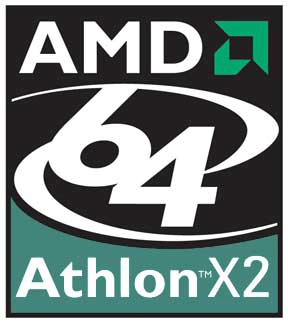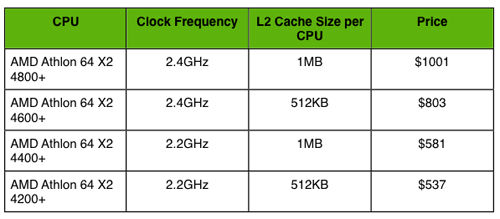AMD's Athlon 64 X2 4800+ & 4200+ Dual Core Performance Preview
by Anand Lal Shimpi on May 9, 2005 12:02 AM EST- Posted in
- CPUs
Both AMD and Intel appear to be playing release date games with their latest dual core processors.
Intel's affordable dual core desktop solution, the new Pentium D, officially launched in the middle of last month, but has yet to be seen in the channel.
AMD appears to be joining in on Intel's game and is lifting their NDA on Athlon 64 X2 performance today, instead of waiting until June as they had originally planned. Note that the timing of today's article doesn't mean that there's any change in the Athlon 64 X2 release or shipping schedule. The CPUs still won't be available until Q3 or Q4 of this year, but AMD appears to want to get performance numbers out there as soon as possible; given the impressive performance that we had previewed in our first article, it's not much of a surprise from AMD.

We've already discussed the pricing and lineup of AMD's Athlon 64 X2 line, but as a quick refresher, here are the tables from our original review:


We've talked quite a bit about the impact of dual core on the desktop, but to keep things to the point, if you're interested in knowing a bit more, please take a look back at the following topics:
- The Intangible Dual CoreThe benchmarks used in this article (including the multitasking tests) are identical to those used in our first AMD dual core article.
- Scheduling and Responsiveness
- Characterizing Dual Core Performance
- Dual Core System Impressions










109 Comments
View All Comments
bcoupland - Monday, May 9, 2005 - link
People have been saying that a dual-core processor at the same speed as a single-core one will not speed up games and such, but I beg to differ: In a real-world situation, one would have MS Antispyware and an AV program running in the background, while running a game. Also, don't forget the OS as well as onboard sound, chipset raid, USB, and other various programs. A dual-core cpu, even for single-threaded apps like most games, will pretty much give that game its own core. I am excited to see the dual-cores come out personally.SLIM - Monday, May 9, 2005 - link
Hey Anand,Nice article as always, but why do you think the extreme edition suffers so badly in some of the benches compared to its non-HT brother???
Is it possible/plausible that some of those terrible results are due to the more cpu intensive apps being saddled on the two logical cores of just one physical core? Do you think bandwidth can really explain the huge drops in performance?
Oh and thanks for the overclocking results too.
SLIM
PetNorth - Monday, May 9, 2005 - link
For those talking about multitasking tests. Look at them carefully and not bla bla bla. I mean: X2 4800+ Vs. PEE 840 and X2 4200+ Vs. PD 840.So, in these 5 Anand multitasking scenarios:
X2 4800+ Vs. PEE 840: 2-3
X2 4200+ Vs. PD 840: 4-1
And don't forget that Multitasking compiling scenario from Opteron DC review is missing in this X2 review: http://www.anandtech.com/cpuchipsets/showdoc.aspx?... Another X2's victory.
philthedrill - Monday, May 9, 2005 - link
Hyperthreading can be a loss when there are memory bandwidth intensive apps. The P4 implementation shares a the data TLB, which ends up thrashing when you have lots of requests that go to memory from both threads.Brian23 - Monday, May 9, 2005 - link
Thank you for the overclocking results!Son of a N00b - Monday, May 9, 2005 - link
I wont be upgrading to a dual core anytime soon, ill stick with my fx55 on water @3000mgz, but when i do go DC its nice to know there will still be a amd heart at the center.pdr - Monday, May 9, 2005 - link
Can y'all start adding some linux tests (32- and 64-bit would be nice) on things like dual core? Everybody seems to think that if you want some oompfh in linux you will obviously want to build a mega-box cluster. But I just want to minimize my kernel compiles (yes, I run Gentoo), video processing (transcode, ffmpeg, mencoder, etc) - I don't want to turn my living room into a data center.Anand Lal Shimpi - Monday, May 9, 2005 - link
For those of you asking for overclocking results, here's what I've seen:Pentium Extreme Edition 840: 3.6GHz was the maximum stable overclock I could obtain with standard air cooling. I had to bump up the voltage by around 5% I believe (it was a while ago so I don't have the numbers fresh in my mind).
Athlon 64 X2 4200+: The best I could do here was just under 2.6GHz (2.53GHz to be exact). This was with air cooling and no voltage tweaks necessary. I couldn't get it totally stable at 2.6GHz.
Take care,
Anand
Quanticles - Monday, May 9, 2005 - link
Anand,Could you run the real world tests with a single-core Pentium to compare against the FX-55?
I'm interested in seeing if there's an issue with how well AMD's platform switches threads. If the Pentium beats out the FX-55 significantly then maybe AMD's platform has trouble switching among huge number of threads. This would mean the X2 would be more suitable for multi-tasking among 2-4 threads where the Pent-D would be more suitable for 6-inf threads.
nserra - Monday, May 9, 2005 - link
#61 "hear what you're saying...to me, they don't seem faster but they do seem "smoother". "There is an easy explanation what you are saying, for example a game on intel does 50 to 70 fps.
On AMD 50 to 100 fps.
Who will be the smoother, the one that appears to be working always at the same speed, because the one that will give you higher differences of performance peaks will of course look "erratic".